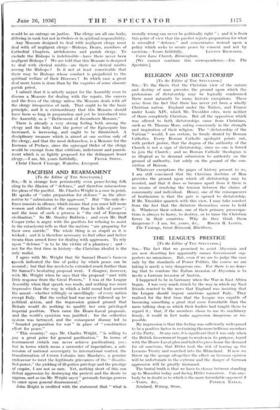PACIFISM AND REARMAMENT
[To the Editor of THE SPECTATOR.] SIR,—It is strange how persistently even peace-loving folk cling to the illusion of " defence," and therefore misconstrue the pleas of the pacifist. Mr. Charles Wright is a case in point. He speaks of " calm preparation for defence " as the alter- native to "submission to the aggressor." But "the only de- fence consists in offence, which means that you must kill more women and children of the enemy than he kills of yours"; and the issue of such a, process is " the end of European civilisation." So Mr. Stanley Baldwin ; and even Mr. Duff Cooper (who is angry with the pacifists for refusing to assist in the cataclysm) tells us that the nations "are preparing for their own suicide." The whole thing is as stupid as it is wicked ; and it is therefore necessary to find other and better means than armed force for dealing with aggressors. To rely upon " defence " is to be the victim of a phantasy ; and— not for the first time in history—the Christian idealist is the only realist.
I agree with Mr. Wright that Sir Samuel Hoare's Geneva speech indicated the line of policy by which peace can be secured ; but that line needs to be extended much further than Sir Samuel's hesitating proposal went. I disagree, however, with Mr. Wright when he says that the proposal " met with little response from the Great Powers." I was at the League Assembly when that speech was made, and nothing was more impressive than the, way in which a bold moral lead secured the assent—whether willingly or unwillingly—of every nation except Italy. But the verbal lead was never followed up by political . action, and the impression gained ground that Britain would do nothing to qualify her own privileged imperial position. Then came the Hoare-Laval proposals, and the world's cynicism was justified ; for the collective system was betrayed, and the consequent dismay led to " frenzied preparation for war " in place of " constructive effort for peace."
" This country," says Mr. Charles Wright, " is willing to pay a great price for general pacification." In terms of rearmament (which can never achieve pacification), yes ; but in terms which mean a surrender of imperialism, a sub- mission of national sovereignty to international control, the transformation of Crown Colonies into Mandates, a genuine endeavour to meet- the legitimate grievances of the dissatis- fied power," the yielding of ill-gotten privilege and the prestige of empire, I am not so sure. Yet, nothing short of this can defeat aggression by destroying the pretext and the desire to aggress, and so (as Mr. Wright says) " persuade foreign powers to enter upon general disarmament."
John Bright is credited with the statement that " what is morally wrong can never be politically right " ; and it is from this point of view that the pacifist rejects preparation for what is miscalled " defence," and concentrates instead upon a policy which seeks to secure peace by consent and not by coercion.—Yours faithfully, LEPTON RICHARDS. Carrs Lane Church, Birmingham.
[We cannot continue this correspondence.—En. The Spectator.]










































 Previous page
Previous page